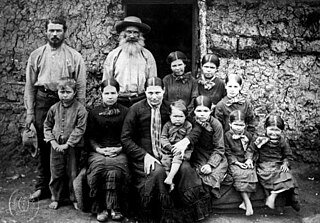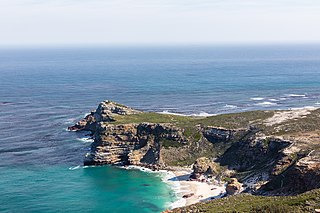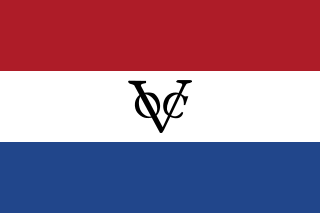| |||||||||
| Decades: | |||||||||
|---|---|---|---|---|---|---|---|---|---|
| See also: | |||||||||
The following lists events that happened during 1841 in South Africa .
| |||||||||
| Decades: | |||||||||
|---|---|---|---|---|---|---|---|---|---|
| See also: | |||||||||
The following lists events that happened during 1841 in South Africa .

Boers is the term used for the descendants of the Dutch-speaking Free Burghers of the eastern Cape frontier in Southern Africa during the 17th, 18th and 19th centuries. From 1652 to 1795, the Dutch East India Company controlled this area, but the United Kingdom incorporated it into the British Empire in 1806. The name of the group is derived from "boer", which means "farmer" in Dutch and Afrikaans.

The Cape of Good Hope is a rocky headland on the Atlantic coast of the Cape Peninsula in South Africa.

The Cape Colony, also known as the Cape of Good Hope, was a British colony in present-day South Africa named after the Cape of Good Hope. It existed from 1795 to 1802, and again from 1806 to 1910, when it united with three other colonies to form the Union of South Africa, then became the Cape Province, which existed even after 1961, when South Africa had become a republic, albeit, temporarily outside the Commonwealth of Nations (1961-94).

The Union of South Africa was the historical predecessor to the present-day Republic of South Africa. It came into existence on 31 May 1910 with the unification of the Cape, Natal, Transvaal, and Orange River colonies. It included the territories that were formerly a part of the South African Republic and the Orange Free State.

The first modern humans are believed to have inhabited South Africa more than 100,000 years ago. South Africa's prehistory has been divided into two phases based on broad patterns of technology: the Stone Age and Iron Age. Australopithecine fossils have been discovered at Taung and in limestone caves at Sterkfontein, Swartkrans and Kromdraai. In 1999, Unesco designated the region the Cradle of Humankind World Heritage site.
The written history of the Cape Colony in what is now South Africa began when Portuguese navigator Bartolomeu Dias became the first modern European to round the Cape of Good Hope in 1488. In 1497, Vasco da Gama sailed along the whole coast of South Africa on his way to India, landed at St Helena Bay for 8 days, and made a detailed description of the area. The Portuguese, attracted by the riches of Asia, made no permanent settlement at the Cape Colony. However, the Dutch East India Company (VOC) settled the area as a location where vessels could restock water and provisions.

The Great Trek was a northward migration of Dutch-speaking settlers who travelled by wagon trains from the Cape Colony into the interior of modern South Africa from 1836 onwards, seeking to live beyond the Cape's British colonial administration. The Great Trek resulted from the culmination of tensions between rural descendants of the Cape's original European settlers, known collectively as Boers, and the British Empire. It was also reflective of an increasingly common trend among individual Boer communities to pursue an isolationist and semi-nomadic lifestyle away from the developing administrative complexities in Cape Town. Boers who took part in the Great Trek identified themselves as voortrekkers, meaning "pioneers", "pathfinders" in Dutch and Afrikaans.

The Griquas are a subgroup of mixed race heterogeneous former Khoe-speaking nations in Southern Africa with a unique origin in the early history of the Dutch Cape Colony. Under apartheid, they were given a special racial classification under the broader category of "Coloured". They are Cape Coloureds who participated in the Great Trek, forming "Griqua States".

Griqualand West is an area of central South Africa with an area of 40,000 km2 that now forms part of the Northern Cape Province. It was inhabited by the Griqua people – a semi-nomadic, Afrikaans-speaking nation of mixed-race origin, who established several states outside the expanding frontier of the Cape Colony. It was also inhabited by the pre-existing Tswana and Khoisan peoples.

Griqualand East, officially known as New Griqualand, was one of four short-lived Griqua states in Southern Africa from the early 1860s until the late 1870s and was located between the Umzimkulu and Kinira Rivers, south of the Sotho Kingdom.
Het Volk was a Transvaal political party, established in May 1904 under the leadership of Louis Botha and his deputy Jan Smuts. Upon the creation of the Union of South Africa in May 1910, it merged with Afrikaner Bond, the South African Party, and the Orangia Unie, the dominant political parties of the Cape Colony and Orange River Colony, creating the pan-Union South African Party.
The Cape Mounted Riflemen were South African military units.

The Battle of Blaauwberg, also known as the Battle of Cape Town, fought near Cape Town on Wednesday 8 January 1806, was a small but significant military engagement during the Napoleonic Wars. After a British victory, peace was made under the Treaty Tree in Woodstock. It established British rule over the Dutch Cape Colony, which was to have many ramifications for the region during the nineteenth and twentieth centuries. A bi-centennial commemoration was held in January 2006.

Afrikaners are a South African ethnic group descended from predominantly Dutch settlers first arriving at the Cape of Good Hope in 1652. Until 1994, they dominated South Africa's politics as well as the country's commercial agricultural sector. Afrikaners make up approximately 5.2% of the total South African population, based upon the number of White South Africans who speak Afrikaans as a first language in the South African National Census of 2011. Afrikaans, South Africa's third most widely spoken home language, evolved as the mother tongue of Afrikaners and most Cape Coloureds. It originated in the Dutch vernacular of South Holland, incorporating words brought from the Dutch East Indies and Madagascar by slaves.

The Cape Colony was a Dutch United East India Company (VOC) colony in Southern Africa, centered on the Cape of Good Hope, from where it derived its name. The original colony and its successive states that the colony was incorporated into occupied much of modern South Africa. Between 1652 and 1691 it was a Commandment, and between 1691 and 1795 a Governorate of the United East India Company (VOC). Jan van Riebeeck established the colony as a re-supply and layover port for vessels of the VOC trading with Asia. The Cape came under VOC rule from 1652 to 1795 and from 1803 to 1806 was ruled by the Batavian Republic. Much to the dismay of the shareholders of the VOC, who focused primarily on making profits from the Asian trade, the colony rapidly expanded into a settler colony in the years after its founding.
The Afrikaner Bond was founded as an anti-imperialist political party in 19th century southern Africa. While its origins were largely in the Orange Free State, it came to have a significant presence across the region, and especially in the Cape Colony and the Transvaal.

Slavery in South Africa existed from 1653 in the Dutch Cape Colony until the abolition of slavery in the British Cape Colony on 1 January 1834. This followed the British banning the trade of slaves between colonies in 1807, with their emancipation by 1834. Beyond legal abolition, slavery continued in the Transvaal though a system of inboekstelsel.

The South African Party was a political party in Cape Colony.

South Africa – Sri Lanka relations refers to the current and historical relations between South Africa and Sri Lanka. The Government of South Africa established its resident diplomatic Mission in Colombo in September 2007. HE Sirisena Amarasekara is the current Sri Lankan High Commissioner to South Africa while HE Ms RP Marks is the current South African High Commissioner to Sri Lanka.

The South African International Exhibition held in Cape Town, Cape Colony was a world's fair held in 1877 which opened on 15 February by Henry Bartle Frere.
See Years in South Africa for list of References